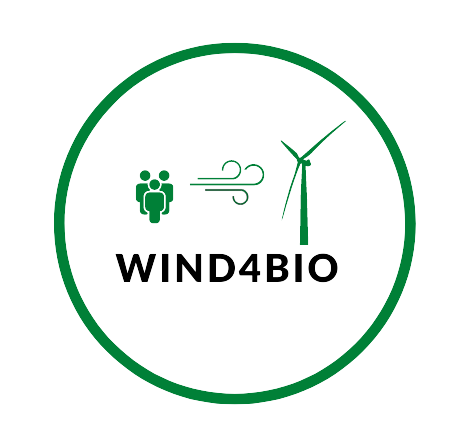
Background
Environmental and biodiversity concerns have slowed down or halted the expansion of wind energy production capacity in GR, LV and PL, since the deployment of wind turbines (especially onshore) can alter the profile of local ecosystems and negatively impact biodiversity and wildlife, through the loss of habitat and increased bird and bats fatalities. Although the public discourse shows principle supportive of wind energy, local communities and environmental groups often express opposition; poor relationships occur between wind energy stakeholders and the civil society, resulting in conflictual protests and property damages.
Objectives
The overall objective of Wind4Bio is to support its target groups (primarily public administrations and authorities, civil society and the wind energy sector) in creating a policy and social environment that is more conducive to the sustainable development of wind energy capacity in the participating territories. To that end, it will focus on addressing one of the main barriers to the proliferation of wind energy, namely biodiversity concerns related to the deployment, operation and retirement of wind turbines.
Consequently, the project will focus on i) accelerating the convergence of biodiversity and wind energy policies, i.e. reaching a modus vivendi whereby biodiversity threat mitigation measures will be an integral part of the design, deployment, operation and retirement of wind turbines and wind farms, and ii) improving transparency through increasing the involvement of and cooperation with the civil society in biodiversity threat identification and mitigation.

Project's Goals
Enable local, regional and national public administrations and agencies (GR, LV, PL) to better understand and address (through policies and measures implementation) civil society’s biodiversity concerns regarding wind energy installations, in order to accelerate wind energy deployment in their territories, as a result of Wind4Bio capacity and knowledge building activities.


Increased social acceptance of wind energy in the territories involved in the project, as a result of Wind4Bio knowledge sharing and collaboration improving activities with the participation of public authorities, the civil society, and the wind energy sector, as well as through increased access to biodiversity risk management and monitoring tools.
Increased capacities on the part of the wind energy sector to integrate biodiversity preservation measures and good practices securing effective civil society participation in project planning and implementation, capitalising upon the guidelines, recommendations and best available practices delivered by Wind4Bio, also available in the form of a voluntary code of conduct.

